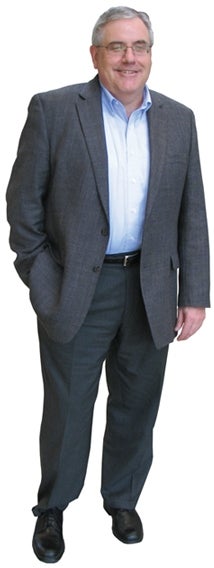By the time Tom Tucker landed at Polaris Service in 1990, he had seen his fair share of high-tech successes and failures. Lucky for him, Polaris — now known as Akibia — ended up being that rare thing: a high-tech startup that actually survived and thrived. Back then, Akibia had just 20 employees and a couple million in revenue. Today, the Westborough-based company, which provides IT support and consulting for data centers and other infrastructure, has 350 employees all over the United State and Europe. Tucker recently added the title of CEO to his business card after serving as president of the company at the right hand of company founder Thomas Willson. Here he talks about how his accounting background has informed his work in high tech.
>> What has changed in terms of your responsibilities with your new title?
There hasn’t been a huge change. It’s more external relations and with customers and a little more internal with employees. But I’ve always been, as president, involved with strategy.
>> You provide IT support to medium- and large-sized companies. Do your technicians tend to work alongside existing IT departments?
We’re usually working with internal people. A lot of the business is traditional maintenance, where they’re under contract and if something breaks, we agree to fix in a certain time frame. That’s a big part of the business. We also give advice on compliance with all the regulations that are in the market now. What we really try to do is help customers to get the most out of their IT infrastructure.
>> So, on the one hand you’re working with hardware vendors like HP or IBM, but on the other hand, you’re competing with those same vendors. That must be a delicate dance.
Well, in some cases yes… We compete with them and then work with them. But that’s pretty typical these days in the world of high tech. Everybody’s got some things where they compete and some things where they work together.
>> Is the business model you had in 1990 the same as the one you have today?
Some is the same, but we’ve added a lot to it. I think the traditional maintenance business is somewhat the same. But we do a lot more things and the data center’s become a lot more heterogeneous. In the old days, data centers were all IBM or all Sun or HP, but now everybody’s got all different types of systems. So the customer has a bigger problem and needs more support.
>> You come from the accounting side of the business, not the engineering side. Are you a technology guy or still a numbers guy?
I’m more of a business guy than a tech guy, although I understand the technology enough to work with the engineers and the customers. I’m more of a business person and I try to steer the company in the right direction. I use people at the company who are experts in the different areas and manage that. I don’t have to know how to fix the machine or install a firewall to be able to run the business.
>> Do you think your accounting background has been an advantage for you?
Yes, I think it is an advantage. I think accounting is always a good basis for business. You have to understand the numbers to be able to run a business. You have to understand how the business makes money and where it makes money. I’ve worked for a lot of companies that had great ideas and technology. But you have to turn that into a business that makes money and sustains itself. You get the ideas from people and you try to build a business model for the long term. That’s what we’ve done here.
>> Obviously you’re in a space that’s growing. The demand takes care of itself. But what are the challenges that this company faces?
The competitive environment is always tough. And with the economy the way it is, people want to get more for less. They’re the same challenges most companies are facing these days.
WEB ONLY >>What’s your view of economic conditions?
I think tech spending has picked up. Last quarter was a very good quarter for us. We’ve seen some pent up demand in some of the new products that we have in the security space. No one’s out going hey boom times are here. I think everybody’s still pretty cautious.
WEB ONLY >>What’s the toughest management that you’ve had to learn?
It’s probably communication, specifically how you communicate with employees on a regular basis. I’ve had to adjust to my new role coming from the financial side. When you’re CEO, you’re under a microscope, so anything you do, people try to read what it means. You have to always be on and make sure you’re keeping a consistent message. Also I’ve learned that people are looking for the CEO to set a steady course. Bad things happen, but how you deal with it and the reaction you give to it is important.

